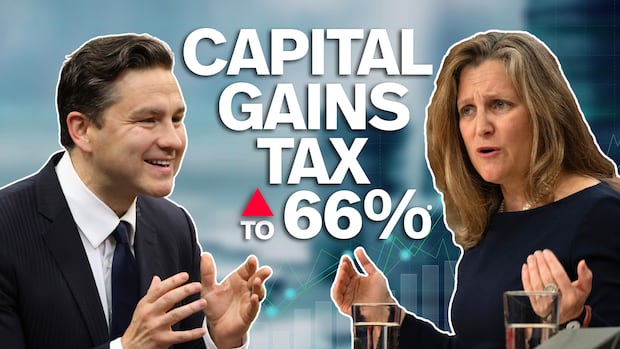Justice Minister Arif Virani has deleted a video about the Liberal government’s capital gains tax changes that contained inaccurate information.
Virani posted a video Monday on social media that was meant to explain to his constituents how the tax changes work. But the video contained a number of errors about what happens when someone gives a secondary residence to a family member, and about the tax rate itself.
The post has since been deleted. When asked about the video during a press conference Tuesday, Virani didn’t directly answer the question.
“The information with respect to capital gains is critical in terms of communicating that out to Canadians,” he said in response. He then went on to repeat Liberal talking points about how the changes are meant to address “fairness” in the tax system.
Virani’s constituency office later provided CBC News with a statement saying that the video required more context.
“There was some nuance in the video posted by MP Virani that would benefit from additional context, so we decided to take it down to minimize confusion,” the statement said.
The video was deleted after Conservative MP Michelle Rempel Garner and Conservative MP Philip Lawrence, in an online post, pointed out errors in what the minister said.
“The minister of justice shouldn’t be putting out misleading information like this to begin with,” Rempel Garner told CBC News.
A capital gain is the difference between an asset’s cost and its total sale price. That asset could be a cottage, an investment property, a stock or a mutual fund. In Canada, primary residences are not included under the capital gains tax.
The changes that took effect last month raised the capital gains inclusion rate for individuals — the amount of a capital gain that is taxable — from 50 per cent to 66.7 per cent for capital gains above $250,000.
The minister began his video by addressing concerns about sales of secondary residences.
The sale of a primary residence does not count as a capital gain. The sale of a secondary residence, such as a cottage or investment property, does count as a capital gain. The higher inclusion rate has raised concerns among some cottage owners about how the changes will affect them, according to some realtors.
Virani said in the video that a family cottage passed onto another family member as a gift wouldn’t be considered a capital gain. That’s not the case.
An individual must still pay a capital gains tax on a secondary property even if they gift it to someone, according to the Canada Revenue Agency website.
“I think that the government spreading misleading information about taxation that could have a material impact on Canadians’ tax returns is highly damaging as is the tax itself,” Rempel Garner said.
In his video, Virani also appeared to conflate the capital gains inclusion rate with the actual tax rate.
Although the video appeared to have been edited, the minister and the accompanying transcript suggested that the increased inclusion rate of 66.7 per cent is the same as the tax rate.
Canada’s capital gains tax increase comes into effect on June 25. Andrew Chang breaks down some misleading claims about the changes coming from both sides of the political aisle and explains who is likely to pay the new tax, how much and how often. Does it really just hit the ultra-rich?
The inclusion rate is the portion of the capital gain subject to tax — which the government increased from 50 per cent to 66.7 per cent for capital gains above $250,000.
But capital gains tax rates themselves — which determine what an individual ends up paying the government — vary depending on income.
Conservative MP Ryan Williams made a similar mistake last month when he tweeted an AI-generated list of G7 countries’ capital gains tax rates.
But Rempel Garner said the two gaffes aren’t comparable and pointed out that this is a policy put forward by a government of which Virani is a member.
“This is the minister of justice who would sit around the cabinet table actually probably looking at this proposal,” she said.


